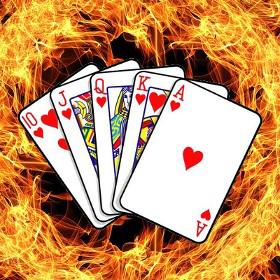Oh Hell!
 Bid on how many tricks you'll win. But someone will inevitably miss their target...
Bid on how many tricks you'll win. But someone will inevitably miss their target...
Oh Hell! is a trick taking standard deck playing card game. The object is for each player to bid the number of tricks they think they can take from each hand, then to take exactly that many; no more and no fewer. Points are awarded only for making the bid exactly, and are deducted for missing the bid, either over or under.
The hook is that at least one player will fail on each hand, because the total number of tricks bid by the players may not equal the number of tricks available on that hand.
Also known as Oh Pshaw and Blackout.
Αριθμός παιχτών: 3 - 7
Διάρκεια παιχνιδιού: 23 mn
Πολυπλοκότητα: 1 / 5
Παίξτε Oh Hell! και 978 άλλα παιχνίδια online.
Χωρίς λήψη. Απευθείας από το πρόγραμμα περιήγησής σας.
Με τους φίλους σου και χιλιάδες παίχτες από όλον τον κόσμο.
Δωρεάν.

Παίξτε Oh Hell! και 978 άλλα παιχνίδια online.
Χωρίς λήψη. Απευθείας από το πρόγραμμα περιήγησής σας.
Με τους φίλους σου και χιλιάδες παίχτες από όλον τον κόσμο.
Δωρεάν.

Περίληψη κανόνων
Players and Cards
- 3 to 7 players.
- The game is best when played with 4 to 6.
- A standard 52 card deck is used.
- The cards in each suit rank (from high to low) A♣K♣Q♣J♣10♣9♣8♣7♣6♣5♣4♣3♣2♣
Sequence of Hands
- The game consists of a series of hands.
- Depending on the settings used, the number of cards dealt per hand will either increase or decrease per hand, and may or may not "rebound" and go the other way afterwards.
- The default is to start high, go to low, and then back to high again.
- The minimum number of cards defaults to 1 but can be changed to 3, while the maximum number of cards defaults to 10 but can also be changed. (6+ player games, of course, will have a lower default maximum.)
Objective
- The objective is for each player to bid exactly the number of tricks they think they can take from each hand.
Deal
- The turn to deal rotates clockwise with each hand.
- The cards are shuffled and the dealer deals the cards singly until everyone has the appropriate number of cards for the hand being played.
- The next card is turned face up and the suit of this card is the trump suit for the hand.
- The trump suit beats any of the other three suits played in that hand.
- The remaining un-dealt cards are placed in a face down stack with the turned trump on top of it.
Bidding
- The bidding in each hand begins with the player to the left of the dealer, then continues clockwise, back around to the dealer, who bids last.
- Each bid is a number representing the number of tricks that player will try to take.
- Everyone must bid - it is not possible to pass, but you can bid zero, in which case your object is to take no tricks at all.
- By default, the hook rule is in effect: the dealer may not bid the number that would cause the total number of tricks bid to equal the number of tricks available; a hand will always be "over-bid" or "under-bid".
Keep in mind when bidding that not all cards in the deck are in play in any hand.
Play
- The play begins with the player to the dealer's left, who leads the first card.
- The lead may be any suit, including trump.
- Play follows clockwise.
- Each player must follow the suit led, if they can.
- If not, they may play any other card in their hand, including trump.
- The player who has played the highest trump card, or if no trump was played, the highest card of the suit led, wins the trick.
- That player then leads to the next trick.
- Continue until all tricks have been played and won.
Scoring
- There are a number of different scoring methods available:
| Method | Successful (points) | Unsuccessful (points) | Description |
|---|---|---|---|
| Positive | gain 10 +[tricks won]
|
gain [tricks won]
|
|
| Blackout | gain 10 + [bid]
|
0
|
|
| Negative | gain 10
|
lose 10 × [difference from bid]
|
Large mistakes are much more costly |
| Balanced | gain 10 + [bid]
|
lose 2 × [difference from bid]
|
A less extreme version of negative |
| Hybrid | gain 10 + [bid]
|
gain [tricks won] if you take fewer tricks than you bid
|
A variant of Positive that encourages higher bids |
| Doubles | gain 10 + 2 × [bid]
|
lose 2 × [difference from bid]
| |
| Triples | gain 10 + 3 × [bid]
|
lose 3 × [difference from bid]
|
|
| Squares | gain 10 + [bid]²
|
lose [difference from bid]²
| |
| Anderson | gain [trick value] × bid
|
lose [trick value] × [difference from bid]
|
The value of one trick starts at 10 points and increases by 10 each hand. |
- All methods except Anderson can also be Vienna, which alters the scoring for a successful bid of 0.
- A successful bid of 0 in Vienna is worth
[cards dealt] + 5.


